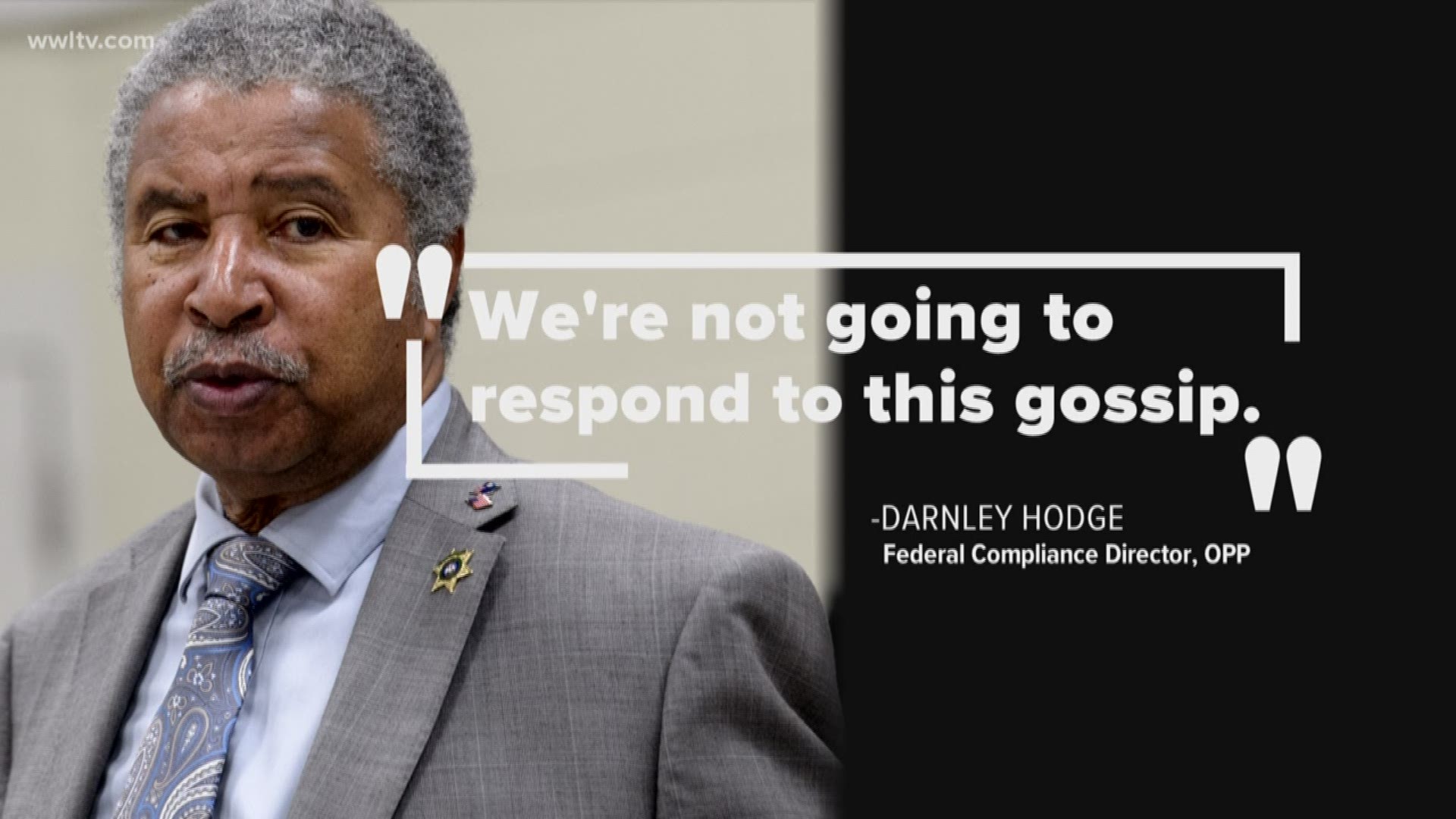NEW ORLEANS -- A former Orleans Parish sheriff's deputy has come forward to say that he witnessed and experienced workplace harassment during his tenure at the city's troubled jail last year.
Kenneth Mackie, 25, is speaking out after a joint investigation by WWL-TV and The New Orleans Advocate into complaints about a culture of workplace harassment at the Sheriff’s Office. He said the agency’s problems extend beyond sexual harassment to include frequent anti-gay remarks from deputies.
“That’s pretty much the culture there. It’s like being on the streets or something,” Mackie said. “It’s not a professional environment. It doesn’t feel like a law enforcement agency.”
Although the agency has acknowledged a high turnover rate, the Sheriff’s Office has resisted suggestions that it needs to change its handling of harassment complaints.
Sheriff Marlin Gusman, who has been stripped of most of his powers by a federal judge because of poor conditions for the jail's inmates, has ignored formal interview requests. At a recent public event, he accused a WWL-TV reporter of “ambushing” him.
“What you’re doing is trying to make a salacious story out of this,” Gusman said. “If you check your facts, check all your facts, then you’ll come up with the conclusion that we came up with: That we have to investigate every single action, every single occurrence, and that’s what we do.”
Recently released records show that the Sheriff’s Office did investigate one of the claims that a current deputy made. That deputy said she heard that Sgt. Aaron Lacey had showed a video of a sexual encounter to other deputies and claimed that it showed the two of them having sex.
The records show Lacey admitted showing the video to another deputy. He told Internal Affairs investigators that he and the female deputy had had a sexual relationship for several months, and he accused her of trying to cause discord between him and his wife.
The female deputy said she never had a sexual relationship with Lacey.
In May, after WWL-TV and The Advocate began asking about sexual harassment, but a day before reporters asked about the Lacey case in particular, the Sheriff's Office imposed a 25-day suspension on him.
Blake Arcuri, the general counsel for the Sheriff's Office, said that the Lacey case investigation and others "were completed prior to any media request, and this illustrates that our system works. We will continue to aggressively pursue unprofessional, unethical or harassing behavior in order to ensure that the OPSO remains an inclusive place to work.”
While that case ended in disciplinary action, other deputies have said their complaints have gone unheeded. Mackie is one of them.
The former deputy, who lives in Bridge City, said that he had big dreams when he joined the Sheriff’s Office in March 2017. He was inspired by the ongoing reform effort ushered in by a binding agreement the office reached with the federal government in 2013.
“I was there to make an impact and to bring forth some type of change,” he said.
Mackie said the training class for deputies was well organized, “like a painted picture.” But his troubles began when he stepped into the Orleans Justice Center.
Mackie said that on June 22, he was standing at roll call. As Sgt. Rose Dillworth began reading off names, she got to one of Mackie’s female colleagues. At that point, according to Mackie, a male deputy quipped that the female deputy was “not a woman, she is more like a man,” and began to laugh.
Dillworth, who has since died, said nothing, according to Mackie.
Mackie said he encountered another incident the next morning. He said that as he was exiting an elevator, he ran into three male deputies who were standing in a hallway, including the deputy who had made the crack at roll call.
He said one deputy told him that the second deputy “was dreaming about you.”
“I was like, ‘What you mean?’ ” Mackie said. “And he was like, ‘You know, he been thinking about you, he trying to get to know you more.’ I was like, ‘What do you mean? What is that supposed to mean?’ And they just began to laugh at me.”
The clear implication was that he was gay, Mackie said.
He said he made written complaints about both incidents but nothing was done.
As his time at the jail wore on, he said, he endured more harassment.
“I went to Human Resources. I wrote formal complaints. I spoke to captains. I requested even a schedule change, to work on another shift to avoid that. It still was not granted. Everyone just swept it under the rug,” he said.
The workplace harassment got so bad that he became depressed and struggled to go to work every day, he said. He also said he was branded a “complainer” and assigned to guard prisoners in a high-security unit, in what he believed was a kind of informal punishment.
Finally, in July 2017, he became one more in a stampede of deputies quitting an agency that had 44 percent turnover last year.
The Sheriff’s Office at first denied receiving a copy of Mackie’s written complaints, but after The Advocate provided the agency with a copy, it changed course.
Arcuri said that Mackie’s complaint got lost because he made it to the wrong person within the Human Resources department, an administrative clerk.
“Since this occurred so far outside of our policies and chain of command, it would have been almost impossible to commence an investigation,” Arcuri said. “With this new information in hand now and with the correct officials, we will open an investigation into this matter immediately.”
Mackie said he still gets upset when he thinks about his time at the Sheriff’s Office.
“Whether I’m gay or not, I should not be subjected to that type of behavior, I should not be bullied or tortured by anyone,” he said. “That’s not law enforcement. When you’re in law enforcement, you have dignity. You stand up with respect.“
The stories that women have told about a culture of sexual harassment among male deputies are true, Mackie said.
“That’s part of the reason why they’re probably calling me gay, because all the guys around there, it’s pretty much they just teaming up to see what next piece of you-know-what they can screw. That’s pretty much the culture there,” he said.
Gusman said that all complaints are taken seriously.
Asked whether he thinks the Sheriff’s Office has a sexual harassment problem, Gusman responded, “No.”


